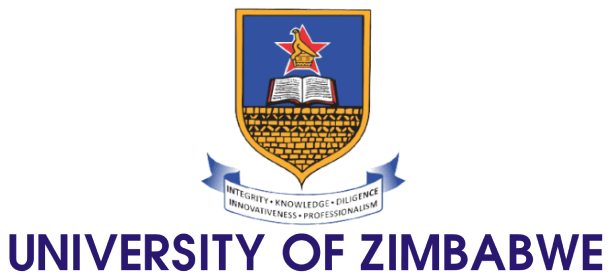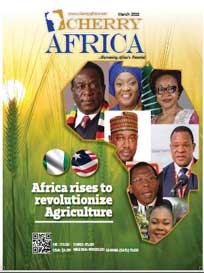The Dean of Agriculture, Environment and Food Systems at the University of Zimbabwe, Dr. Elijah Nyakudya discusses agriculture with Cherryafrica
Since the outbreak of the Covid-19 pandemic, Zimbabwe, much like the rest of the global community, has experienced gaps in food security and other resources. The Russia-Ukraine war, which has disrupted the global food supply chain has worsened the already bad situation. In sync with the underpinning vision of the Strategic Agricultural Conference in Africa (SACA), CherryAfrica, the organisers of the conference in partnership with Ministry of Lands, Agriculture, Fisheries, Water and Rural Development in Zimbabwe touched base with the Dean, Faculty of Agriculture, Environment and Food Systems, the University of Zimbabwe (UZ), Dr. Elijah Nyakudya to not only engage with him on the conference but also for a chat to learn more about the new initiatives in the institution aimed to respond to the unfolding challenges. It was learned that the university has evolved new strategies and broadened its scope and capacity in a bid to address these shortcomings.
The University of Zimbabwe is the oldest and largest university in the country, and it was reasoned by the organisers of SACA, that its experiences would count. This is more so when consideration is given to its farm size, which measures 1,636 hectares.
Plans are also underway for delegates to the forthcoming SACA to visit the university where the Head of Agriculture in Africa Union Commission would address 5,000 students from various universities in Zimbabwe and other African universities via Zoom. Delegates are also programmed to tour the university’s Agro Park for hands-on experience and training on different aspects of agriculture.
CherryAfrica further learned that the university is working to sign partnership agreements with interested West African universities, especially in Nigeria, Ghana, Uganda, Gambia and others, for exchange of programmes, and more.
The beginning of the year for University of Zimbabwe saw not only a name change for the faculty of Agriculture but the addition and modification of departments within the faculty and a tweak of programmes at undergraduate and postgraduate levels. Dr. Nyakudya said the faculty had emphasized outcome-based research with tangible results that apply to the current agricultural climate in Zimbabwe and the farming community of Africa as a whole.

Dr Nyakudya gave more insight and explained the workings of the departments within the faculty, which started with the Department of Plant Production and Technology that has been changed to the Department of Crop Science. The idea behind the change, he said, is to expand the department’s activities to find sustainable seed and crop systems for maximum yields.
The Department of Agricultural Business Development and Economics, which is aimed at looking at the farming aspect and business side of things has also been reinforced to focus the department’s research mainly on Agriculture information systems, otherwise known as digital systems.
The Department of Soil Science and the Environment is another feature of the faculty. As the name suggests there is a focus on the soil itself; with research looking at soil productivity, agrosystems development, and water and waste management. The department’s existence is an acknowledgement that there are other factors that go into successful farming, which deserve attention as well.
The Department of Agriculture and Bio-systems in Agriculture is another department within the UZ agriculture faculty. The department is driving towards the mechanisation of food systems and working on getting a handle on post-harvest losses. According to Dr. Nyakudya, Africa loses over 25% of its yield in the post-harvest stage.
The fifth department is Livestock Science which looks at livestock. The University has recently started using artificial insemination to multiply its herd of about 600 cattle. The practice is meant to boost reproduction and introduce new bloodlines and breeds to the herd. The Park is also in the process of building a poultry house with the capacity of holding 12,000 birds.
Dr. Nyakudya also mentioned the Agricultural Business and Communal Education directorate. “Agriculture should be a business,” states the Dean, the directorate is focusing on taking the lead in addressing national challenges about Agriculture. Dr Nyakudya expressed a great need to contribute to economic development through the farming sector.
As a nation, Zimbabwe faces a lot of challenges in its agricultural activities, from a lack of effective farming methods to high costs of production. To effectively address these and realise the essence of the new initiatives Dr. Nyakudya spoke on the mismatch between the cost of the finished product and the cost of production. For instance, the cost of fertilisers and herbicides is very high and sets back farmers financially significantly.
Dr Nyakudya expressed interest in creating models that speak to the improvement of efficiency and processes. “There is also a need to formulate strong value chains from the farm to the market. The directorate also seeks to deal with issues about technology; business and training capacity in not just large-scale farming but the small communities that don’t have much,” he told CherryAfrica.
The Dean also spoke about Education 5.0, a modification of Education 3.0 which adds innovation and industrialization as missions of universities. The initiative is to align national ambitions to attain middle-income status by the year 2030.
The aim is to give students practical skills along with the knowledge they receive from the classroom. As Dr Nyakudya says, “Knowledge without practical skills doesn’t make one productive thus making it meaningless.”
The Dean also shed more light on the university’s Agro-Park where various types of Agri-activities are taking place from livestock breeding to crop farming to industrial activities. The university intends to turn the Agro-Park into a model lab where technology and solutions are created. This park is also a great place for students to gain experience and the practical skills mentioned above. The Agro-Park also trains students from other smaller agricultural institutions. It is through activities and hands-on training in the park that talent is identified and further nurtured within students.
In addition, the university is working on building an Agro-Processing plant. For instance, a bakery plant is in the works that is looking for an alternative to wheat for bread production. Sweet potato bread is an option the plant is looking into as it is cheaper to produce and cuts down on imports. The Dean further informed CherryAfrica that a 30% deposit has been made on an oil processing plant. The hopes are to process oil out of crops like soya beans to get cooking oil and use the by-product of such processes to make livestock feed. According to Dr Nyakudya, livestock feed accounts for anywhere from 50% to 60% of costs for farmers, which isn’t sustainable or cost-effective.
“It’s not that we want to compete with anyone, but we want to come up with solutions to clear agriculture problems,” says the Dean. The intention is to make Zimbabwe as self-sufficient as possible. The park wants to produce raw materials like soya beans, potatoes, and maize; and hopes to get other farmers involved in producing these materials for the processing plant. The park also aspires to produce starch and hopefully, some day will produce materials for pharmaceutical use.
Dr Nyakudya also acknowledged the university’s responsibility to its community. In line with this responsibility, there is a vision to promote horticulture for both domestic and foreign markets. The university is always on the lookout for partners for these and other projects of the University which has been underreported. Currently, there is a partnership with the Agriculture Marketing Authority (AMA) and SACA will be the stage where these and other matters will be discussed and demonstrated in more concrete terms as Africa comes together to learn and evolve as one continent in the Agriculture arena.
Hezal Lifa writes from Zimbabwe.















